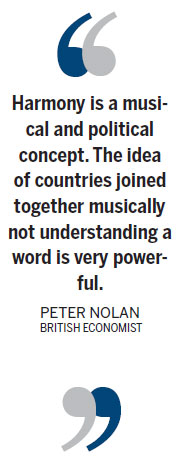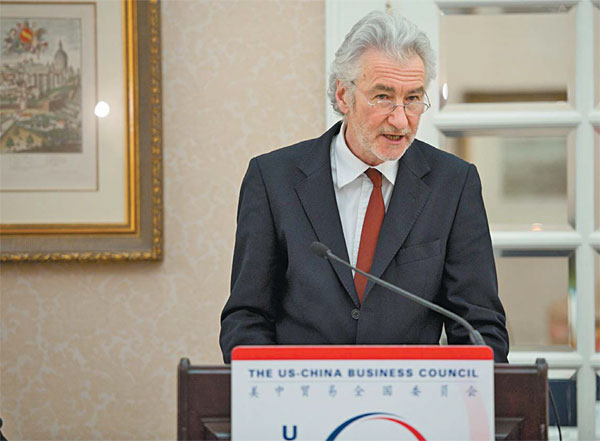A 'painfully blinkered view'
Updated: 2014-11-21 08:45
By Pu Zhendong(China Daily Europe)
|
|||||||||||
Expert challenges perception generated by Western media and calls for peaceful international relations for modern Silk Roads to succeed
Is the new Silk Road Economic Belt a sign of China's political expansion? Will war break out in the South China Sea? British economist Peter Nolan shrugs off both questions with a firm "No".
Nolan, a professor in Chinese development at Cambridge University whom the Financial Times says "knows more about Chinese companies and their international competition than anyone else on Earth, including in China", says Western stereotypes of China are seen through a "painfully blinkered view".
|
British economist Peter Nolan says China recently articulated a simple and powerful message through the "One Road, One Belt" strategy issued by President Xi Jinping. Provided for China Daily |
"The West's preoccupation with China's involvement in the South China Sea is in the sharpest contrast to the complete absence of analysis of the West's vast exclusive economic zone that derived from its colonial past," Nolan writes in his book Re-balancing China.
"This raises deep questions about the nature of the international media and the way in which perceptions among the general public in the West are shaped," he adds.
As director of the Center of Development Studies at the University of Cambridge, Nolan has researched, written and taught on a wide range of issues in economic development, globalization and the transition of former planned economies. In 2009 he was awarded Commander of the Order of the British Empire "for services supporting China's integration into the global economy".
He also oversees a program that brings CEOs from China's largest firms to Cambridge every year to receive training from academics and leaders of international firms.
In late September, Nolan delivered a speech in Beijing to discuss China's initiatives to establish the Silk Road Economic Belt and the Maritime Silk Road at the invitation of the 48 Group Club Young Icebreakers, which promotes Sino-British relations among young professionals.
In the speech, he reflected on China's historical impact on Europe, Central Asia and Southeast Asia in the pursuit of trade, given China's current status in the global economic environment, and said he disagrees with former US Secretary of State Hilary Clinton, who said in 2012 that "the 21st century will be America's Pacific century, just like previous centuries have been."

"In fact, the West has been in the Asia-Pacific region for quite a limited period of time. While the West has a brief 200-year history of interaction with the region, China has a deep 2,000 years," Nolan says.
China's old Silk Roads by land and sea developed as early as the Han Dynasty (206 BC-AD 220) through a network of merchants and expanded during the Tang Dynasty (AD 618-907). Trade along the routes covered much of Central Asia and across the South China Sea to Southeast and South Asia.
Nolan says China recently articulated a simple and powerful message through the "One Road, One Belt" strategy issued by President Xi Jinping last year.
During his four-country trip through Asia last month, Xi pledged to align China's competitive industries with the geographical features and development needs of Tajikistan, the Maldives, Sri Lanka and India by building the two modern Silk Roads.
"Xi has emphasized the ancient root of China's relationship with the regions around it and called on 'the harmony of civilizations'," Nolan says. "Harmony is a musical and political concept. The idea of countries joined together musically not understanding a word is very powerful."
The economist also believes that infrastructure is central to developing the modern Silk Roads because it will help expand international economic ties and deepen cultural interactions.
"In recent decades, China has accumulated more experience than any other country in financing, building and operating infrastructure projects," he says. "The development of road and rail technologies and the transformation of political structures in Central Asia has also opened up the possibility for the land route."
Nolan says large investments in infrastructure for countries along the sea route are necessary for the modern Maritime Silk Road to reach its full potential, especially since infrastructure in South and Southeast Asia is underdeveloped.
"There are large potential mutual benefits from international cooperation in the provision of a wide range of infrastructure projects that can support accelerated growth and improvement of mass welfare in the countries along the sea route of the New Silk Road," he says.
But, as Nolan points out, the Western media have overblown maritime disputes between China and regional neighbors in the East and South China Seas during the past two years. China's territorial claims in the region have been perceived as a state-sponsored "resource grab" and an example of "bullying behavior".
In March, during China Development Forum 2014 in Beijing, Nolan said peaceful international relations are the fundamental prerequisite for success of the New Silk Roads.
"(Former Chinese leader) Deng Xiaoping's approach of 'setting aside disputes and pursuing joint development' provides an important guide for the philosophy of infrastructure development along the New Silk Roads, whether by land or sea," he said at the forum.
Nolan says history should play a role in the global distribution of property rights over resources in the South China Sea, especially under the United Nations Convention on the Law of the Sea, which entitles a state to administrate exclusive economic zones up to 200 nautical miles from its coastline.
According to Nolan's calculations, China has around 900,000 square kilometers of undisputed exclusive economic zone adjacent to the mainland and is further claiming an area less than 2 million sq km in the South China Sea. But the total exclusive economic zone in and around the Pacific Ocean that existed as a direct consequence of Western colonial expansion amounts to 30.9 million sq km.
"In the sharpest contrast to the European powers and their colonial settler descendants, China did not seek to construct an overseas empire. Apart from its claims in the South China Sea, China has no overseas island territories to which it lays claim," Nolan says.
"The West should also think carefully about the facts of our history in order to have a useful conversation and build trust."
puzhendong@chinadaily.com.cn
(China Daily European Weekly 11/21/2014 page28)
Today's Top News
China wants its voice heard in cyberspace
New standards set for air purifiers
Alipay brings the frenzy of Black Friday to China
US violates China sovereignty in HK
Cyber terrorism sparks Internet debate
Editorial: Mob politics rocks HK
UnionPay offers discounts to outbound tourists
Palace Museum opens door to special groups for free
Hot Topics
Lunar probe , China growth forecasts, Emission rules get tougher, China seen through 'colored lens', International board,
Editor's Picks

|

|

|

|

|

|






